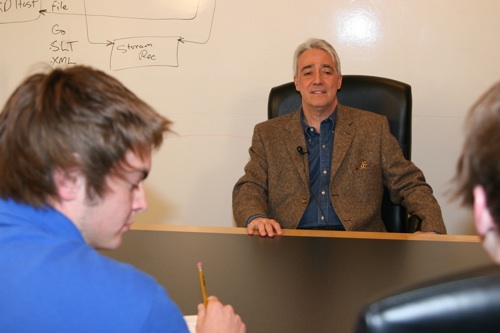Power of the Question
Lesson 1: The Naive Question
WARM-UP ACTIVITY

Izaak Hayes, 19 (left) and Nick Greven, 18 at NPR.
In their journals, ask students to free-write in response to a naïve question, such as “Why are you in this class?” or “What is the point of coming to school?” After students have had a chance to respond to the question, encourage several students to share their responses.
CONCEPT FORMATION
Ask students to consider the warm-up question. What are the characteristics of this type of question? How did students react to answering this question? What kind of responses did this question generate?
Inform students that this question is an example of a naïve question. Ask students to define the word “naïve” and share examples of how they have heard this word used in other contexts.
To learn more about the idea of naïve questions and types of questions in general, introduce students to veteran radio host Scott Simon, using NPR’s bio: In advance, highlight three or four facts in the biography that are evidence that Simon is an appropriate model for the questioning process.
Show part one of the Simon video and ask students to listen for his definition of a naïve question. Encourage students to write the definition and an example in their notebooks.
You can watch the entire Simon video here.
After viewing the first section of the video, brainstorm a list of naïve-question characteristics. Record this list on the board or chart paper. For example, naïve questions ask people to explain basic meanings or implied understandings that often go unstated. They can force people to look at something from a different perspective or uncover simple, but powerful, feelings and responses.
APPLICATION
Working with a partner, ask students to develop five naïve questions and then identify a situation in which each question might be posed. Use the graphic organizer, like the sample below, to help students organize their responses.
| Naive questions | In what situation would this type of question be useful? |
| Example: Why do you teach? | Ask this question to your teacher to better understand their motivation and interest in teaching. |
| Why were you fighting? | Ask this question to a soldier who has just returned from the Iraq war. |
Ask each group to share their best example of a naïve question. Encourage the rest of the class to suggest a situation where this question would be helpful to ask.
HOMEWORK
Tell students to listen/watch a news program either on the radio or television for 30 minutes. Make a list of all the naïve questions that were asked.


